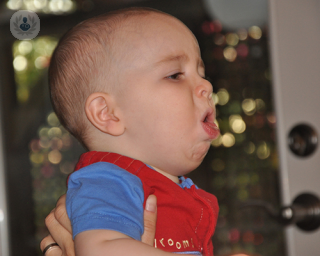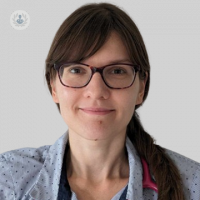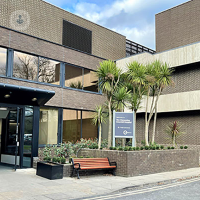What is bronchiolitis?
Bronchiolitis is a viral condition characterised by the swelling of the small airways. It is most commonly seen in children but in rare cases can develop in adults. Bronchiolitis is usually a self-limiting condition and improves after 2-3 weeks, however if you are concerned about the condition, you should seek a consultation with a specialist pulmonologist or paediatric pulmonologist.

What are the symptoms of bronchiolitis?
The most common symptoms of bronchiolitis are:
You should take your child to the doctor immediately if you notice symptoms such as:
- difficulty breathing
- fast breathing
- vomiting
- dehydration
What are the causes of bronchiolitis?
The most common cause is the respiratory syncytial virus (RSV), to which more than half of the babies are exposed during their first year of life. This virus spreads by coming into direct contact with the secretions of the nose and throat of the person with the disease. It can be spread by coughing or sneezing, or touching the same objects.
The following factors increase a person’s risk of developing the condition:
- being younger than six months
- being exposed to cigarette smoke
- living in crowded conditions
- being born before 37 weeks of gestation
- not being breastfed
Can bronchiolitis be prevented?
Bronchiolitis cannot be prevented in most cases since the viruses that cause it are highly prevalent and difficult to avoid. You can reduce the chance of your child catching the virus by:
- washing your hands regularly before every meal
- not smoking in the home
- disinfecting surfaces and toys from time to time
What is the treatment for bronchiolitis?
As the infection is caused by a virus, antibiotics are not effective in tackling the condition. After 2-3 weeks your child should be able to fight off the virus and symptoms will largely disappear. In the meantime, treatment aims to relieve symptoms, and consists of taking the following measures:
- drinking plenty of liquids
- getting plenty of bed rest
- not letting anyone smoke in close proximity
If your child is having trouble breathing, it is important to get immediate medical attention. Emergency treatment may involve oxygen therapy and taking fluids through IV drip.
02-03-2016 09-28-2023Bronchiolitis
Dr Mark Rosenthal - Paediatric respiratory medicine
Created on: 02-03-2016
Updated on: 09-28-2023
Edited by: Jay Staniland
What is bronchiolitis?
Bronchiolitis is a viral condition characterised by the swelling of the small airways. It is most commonly seen in children but in rare cases can develop in adults. Bronchiolitis is usually a self-limiting condition and improves after 2-3 weeks, however if you are concerned about the condition, you should seek a consultation with a specialist pulmonologist or paediatric pulmonologist.

What are the symptoms of bronchiolitis?
The most common symptoms of bronchiolitis are:
You should take your child to the doctor immediately if you notice symptoms such as:
- difficulty breathing
- fast breathing
- vomiting
- dehydration
What are the causes of bronchiolitis?
The most common cause is the respiratory syncytial virus (RSV), to which more than half of the babies are exposed during their first year of life. This virus spreads by coming into direct contact with the secretions of the nose and throat of the person with the disease. It can be spread by coughing or sneezing, or touching the same objects.
The following factors increase a person’s risk of developing the condition:
- being younger than six months
- being exposed to cigarette smoke
- living in crowded conditions
- being born before 37 weeks of gestation
- not being breastfed
Can bronchiolitis be prevented?
Bronchiolitis cannot be prevented in most cases since the viruses that cause it are highly prevalent and difficult to avoid. You can reduce the chance of your child catching the virus by:
- washing your hands regularly before every meal
- not smoking in the home
- disinfecting surfaces and toys from time to time
What is the treatment for bronchiolitis?
As the infection is caused by a virus, antibiotics are not effective in tackling the condition. After 2-3 weeks your child should be able to fight off the virus and symptoms will largely disappear. In the meantime, treatment aims to relieve symptoms, and consists of taking the following measures:
- drinking plenty of liquids
- getting plenty of bed rest
- not letting anyone smoke in close proximity
If your child is having trouble breathing, it is important to get immediate medical attention. Emergency treatment may involve oxygen therapy and taking fluids through IV drip.


Common causes of wheezing in babies and children
By Dr Mark Rosenthal
2025-01-24
Esteemed consultant respiratory paediatrician, Dr Mark Rosenthal the most common reasons your child may be wheezing. See more


Bronchiectasis: symtoms, causes and how COVID-19 has affected treatment
By Dr John Chinegwundoh
2025-01-21
The number of people in the UK with bronchiectasis is increasing. So, we spoke to Dr John Chinegwundoh, a respiratory physician in London, to find out what is causing it, how it is different to other conditions such as bronchitis and COPD, and how COVID-19 is affecting treatment at the moment. See more


Chronic bronchitis: Causes, symptoms, and care
By Dr Shalin Diwanji
2025-01-15
Bronchitis, an inflammation of the mucous membranes lining the airways in the lungs, can be a debilitating condition, especially when it becomes chronic. Chronic bronchitis, defined as lasting more than three months for two consecutive years, poses significant challenges to those affected. In his latest online article, Dr Shalin Diwanji delves into the causes, symptoms, and management strategies for this condition. See more


What parents need to know about bronchiolitis
By Dr Pramod Nair
2024-12-05
If your child is wheezing, finding it difficult to breathe and has a mild fever, it could be a case of bronchiolitis. We spoke to one of our leading paediatricians Dr Pramod Nair about the respiratory virus, including whether it is a serious condition, how to recognise it and how it can be treated. See more
Experts in Bronchiolitis
-
Dr Mark Rosenthal
Paediatric respiratory medicineExpert in:
- Bronchiolitis
- Sleep disorders
- Asthma in children
- Pneumonia in children
- Chronic cough
- Chest infection
-
Dr Dan Ornadel
Pulmonology & respiratory medicineExpert in:
- Breathing problems
- Cough
- Lung cancer
- Asthma
- Bronchiolitis
- Sleep apnoea
-
Dr Atul Gupta
Paediatric respiratory medicineExpert in:
- Asthma
- Chronic cough
- Chest infection
- Bronchiolitis
- Pneumonia
- Wheezing
-
Dr Edyta Newman
PaediatricsExpert in:
- Children’s primary care
- Health check up (health screening)
- Infant colic
- Infectious diseases
- Bronchiolitis
- Constipation
- See all

Medicare Clinic
Medicare Clinic
603 Oxford Rd, Reading RG30 1HL, United Kingdom
No existe teléfono en el centro.
By using the telephone number provided by TOP DOCTORS, you automatically agree to let us use your phone number for statistical and commercial purposes. For further information, read our Privacy Policy
Top Doctors

The Clementine Churchill Hospital - part of Circle Health Group
The Clementine Churchill Hospital - part of Circle Health Group
Sudbury Hill, Harrow HA1 3RX
No existe teléfono en el centro.
By using the telephone number provided by TOP DOCTORS, you automatically agree to let us use your phone number for statistical and commercial purposes. For further information, read our Privacy Policy
Top Doctors

The Portland Hospital - part of HCA Healthcare
The Portland Hospital - part of HCA Healthcare
205 - 209 Great Portland St. W1W 5AH
No existe teléfono en el centro.
By using the telephone number provided by TOP DOCTORS, you automatically agree to let us use your phone number for statistical and commercial purposes. For further information, read our Privacy Policy
Top Doctors
-
Medicare Clinic
603 Oxford Rd, Reading RG30 1HL, United Kingdom, ReadingExpert in:
- Allergy
- Cardiology
- Orthopaedic surgery
- Ultrasound
- Endocrinology
- Fertility
-
The Clementine Churchill Hospital - part of Circle Health Group
Sudbury Hill, Harrow HA1 3RX, West LondonExpert in:
- Abdominal ultrasound
- Abdominoplasty
- Acne
- Allergies bronchopulmonary
- Allergies nose and ears
- Allergy Dermatitis
-
The Portland Hospital - part of HCA Healthcare
205 - 209 Great Portland St. W1W 5AH, Central LondonExpert in:
- Neurological spinal surgery
- Orthopaedic spinal surgery
- Maternity care
- Pregnancy
- Scoliosis
- In vitro fertilisation (IVF)
- See all
- Most viewed diseases, medical tests, and treatments
- Respiratory infection
- Snoring
- Immunotherapy
- Child nutrition
- Migraine
- Paediatric rheumatology
- Autoimmune diseases
- Joint pain
- Nutrition
- Abdominal pain






